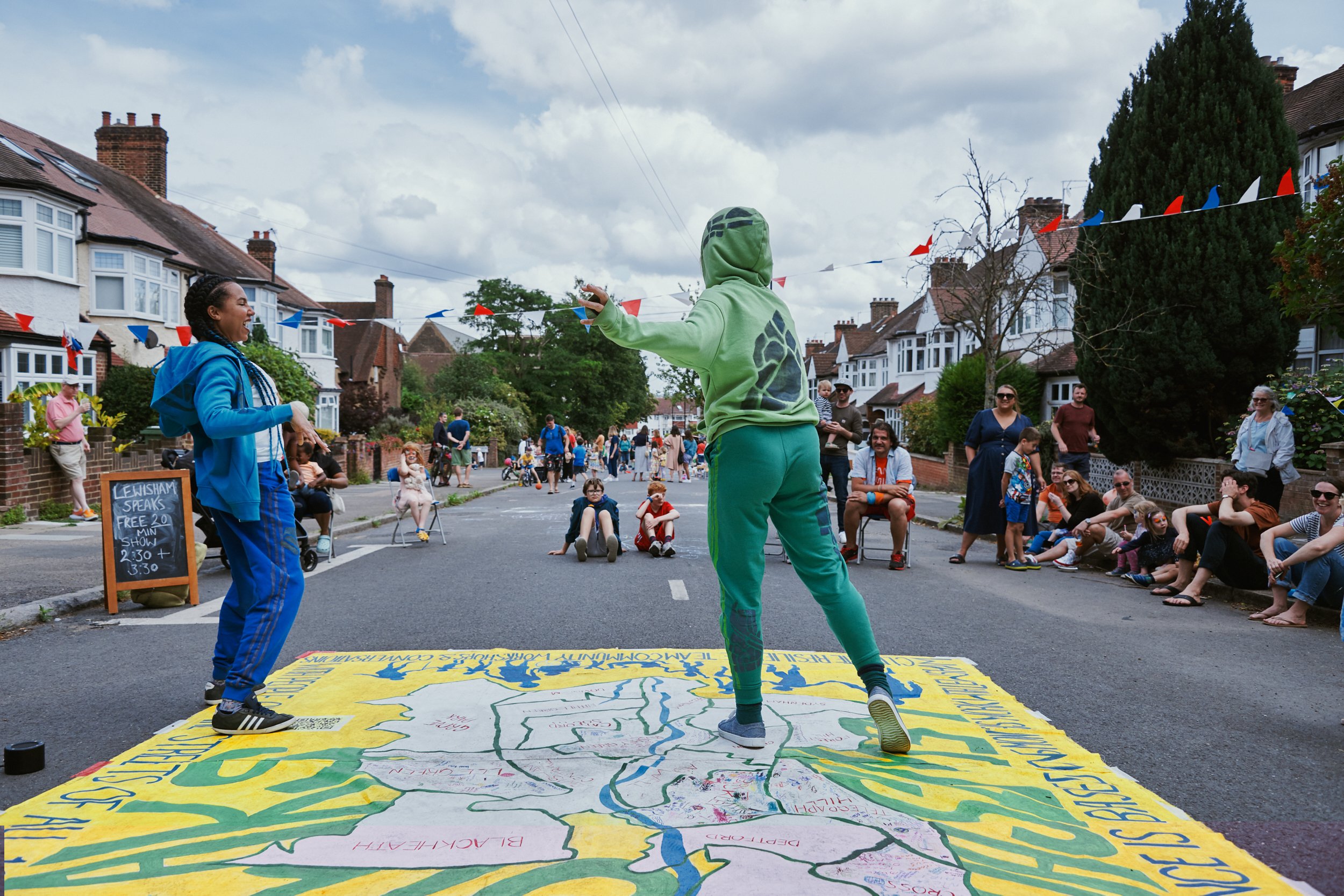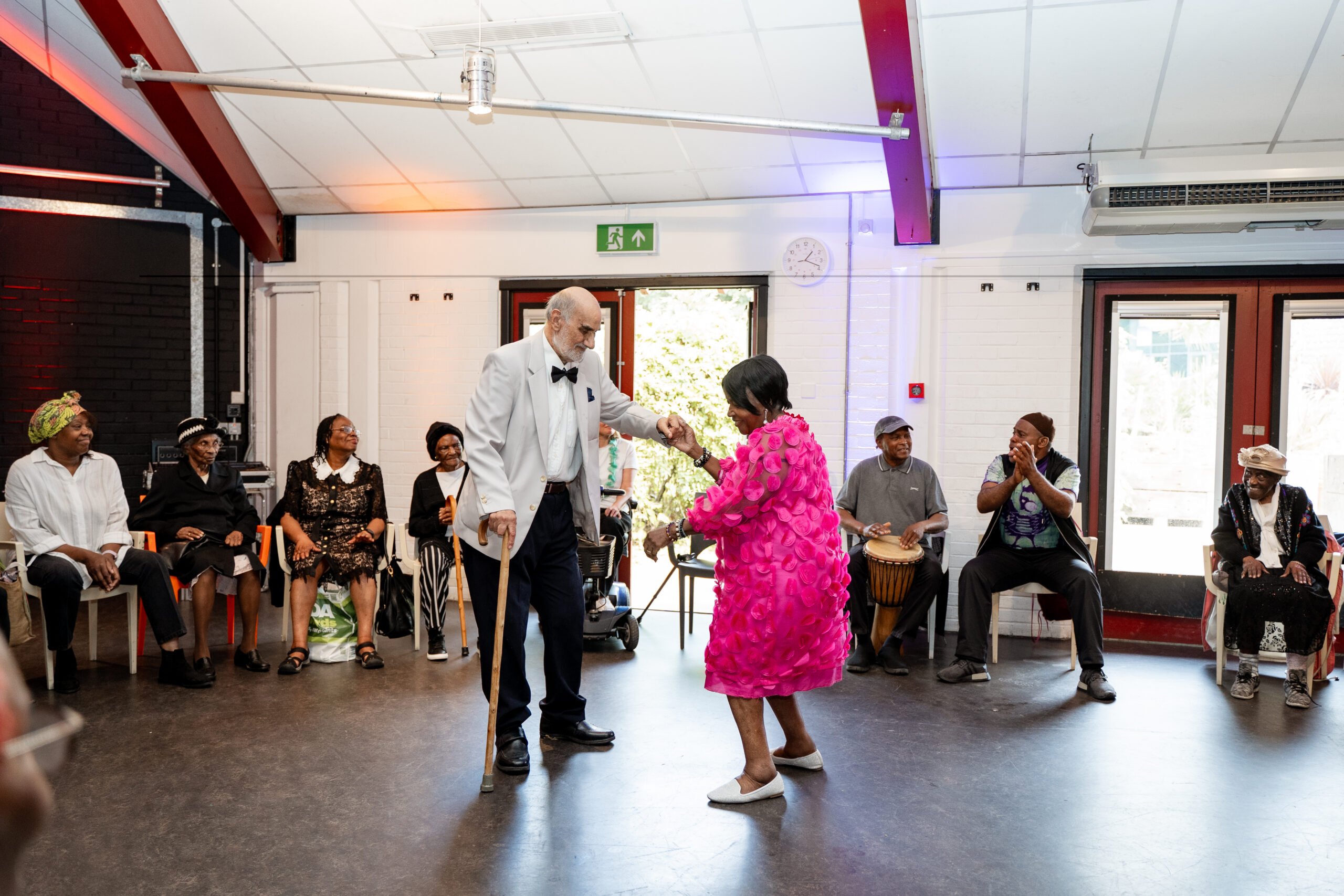
Teatro Vivo performing in Lewisham, The Albany's home borough
Photo: Suzi Corker
Reframing relationships with local authorities
At a time of increasing pressure on budgets for both arts organisations and local authorities, Gavin Barlow of The Albany explores how they might work together differently.
A vital part of the south east London community for over 125 years, The Albany is a long-established arts centre and cultural hub which attracts audiences of over 60,000 every year. A vibrant space which celebrates creativity in many forms, it has been appointed Lewisham’s arts and culture anchor organisation.
Despite many successes, the vulnerability of arts organisations over the past few years is clear. According to recent research by Future Arts Centres (FAC), 76% of arts centres operated at a loss in 2022-2023. And yet, they excel at generating income, as evidenced by the fact that 65% of their turnover came from earned income, with most arts centres having a diverse range of income streams beyond ticket sales.
Harnessing this entrepreneurial spirit
I think we can harness this entrepreneurial spirit to reframe our relationships with local authorities. FAC, a UK-wide network of more than 160 arts centres, has been focusing on developing arts centres as creative enterprises and this has emerged as one of the key ideas for future development.
This may seem counterintuitive. Revenue funding for culture and related services from local authorities has decreased by 48% in England over the last 13 years of austerity. Arts centres are more vulnerable to this reduction than most as 67% of FAC members are funded by their local authority funded, and a further 17% are local authority owned.
The Albany’s journey over the last 15 years with Lewisham Council has seen a shift from being a sometimes problematic member of their funding portfolio to a strategic partner.
Leveraging skills to deliver a sustainable programme
In 2012, we started managing Deptford Lounge, a £24m building with a library and community/event facilities. Our approach was to leverage not just the building, but also our skills in forging partnerships and community engagement to deliver a sustainable programme. Over time, we’ve built diverse relationships, provided social benefits to local communities and increased income.
Meet Me at The Albany, launched in 2013, is an award-winning programme for older people, which began as a partnership with Entelechy Arts and the council’s community team, aiming to provide a more impactful alternative to day centres.
That initial council support allowed us to forge connections with the local health and social care sector, and build Meet Me… into a flagship project, now sustainable without direct council support. It was an added bonus for the council when the programme won the Best Local Authority Arts Initiative at the inaugural Hearts for the Arts Awards.
We began to collaborate on bids for competitions and funding, most notably for Lewisham London Borough of Culture, which was awarded to us in 2022. As the lead producer for the year, and through spearheading fundraising and programming efforts, we helped bring unprecedented opportunities for the borough. The programme was co-created with the people of Lewisham, amplifying communities, stories and talents and welcoming over 400,000 visitors, working with 1,800+ volunteers and involving 92% of local schools.
Continues…

Meet Me… at the Albany, dancing at the 2024 summer party. Photo: Elena Ledgister
Having a seat in local decision-making is vital
Following a successful year, we were able to embed a strong legacy which continues to reap benefits for The Albany, the sector and the borough. We helped establish a new cultural strategy for the borough and the new sector-led Lewisham Cultural Partnership. Our role in Lewisham has also enabled us to build relationships with other sectors, leading to partnership working, new contracts and funding opportunities.
Of course, it takes time to build trust, and it’s an ongoing process. It’s also important to look beyond personal contacts and instead build relationships with the teams responsible for young people, community services and economic development.
Confidence is key: arts centres should give themselves permission to reach out to people at all levels – including the CEO and council leader – to communicate their own agendas and to demonstrate how they can support theirs.
Venue failures often occur when a focus on local impact is lost. Having a seat at the table in local decision-making and placemaking is increasingly important. With devolution a major government agenda, local authorities are eager to embrace co-creation with local people, moving beyond traditional channels of engagement and consultation.
Using culture to connect people to policy makers
The theme of our work during the Borough of Culture year was cultural activism. We experimented with using culture and creativity to connect local people to policy makers. Key initiatives included Artists of Change, embedding artists in Lewisham departments to influence policy, and Climate Home, a youth-led reimagining of a council-owned adventure playground, culminating in a six-week festival that directly influenced council policy.
There is a real opportunity to use our expertise to add value, and to recognise that we are potential leaders in a process of community-led regeneration. The Albany, like many arts centres, has experience and creativity and has built up trust with a wide demographic of local people over many years.
We meet people on their own ground, and broker meaningful conversations about the issues which affect us all. So we can stake our claim as not only an essential part of the local cultural ecology but as a key strategic partner of the local authority.
The role arts organisations can play in creating change and space for local people is undeniable – empowering communities to envision a brighter future and actively help shape it into reality.
Join the Discussion
You must be logged in to post a comment.